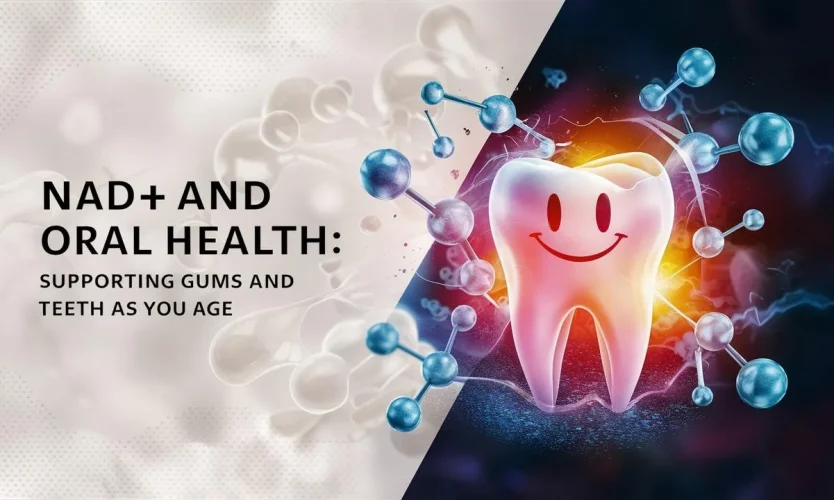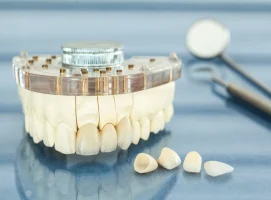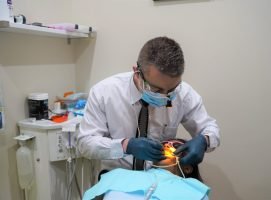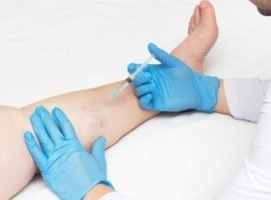NAD+ and Oral Health: Supporting Gums and Teeth as You Age
Oral health is a key component of overall wellness, especially as we age. Maintaining the health of gums and teeth becomes increasingly challenging due to natural wear, changes in diet, and aging effects. Nicotinamide Adenine Dinucleotide (NAD+), a molecule essential for cellular energy production and repair, has gained attention for its potential role in supporting oral health, particularly in preserving the integrity of gums and teeth.
The Role of NAD+ in Oral Health
NAD+ is involved in various cellular processes, including energy metabolism, DNA repair, and inflammation regulation. These functions are particularly important in oral health, where cells in the gums and teeth are constantly exposed to stressors like bacteria, food particles, and environmental factors. As NAD+ levels decline with age, the ability of oral tissues to repair themselves and fight infections diminishes, increasing the risk of gum disease, tooth decay, and other oral health issues.
How NAD+ Supports Gum Health
- Enhancing Cellular Repair
The gums are composed of soft tissue that is susceptible to damage from everyday activities such as eating, brushing, and exposure to bacteria. NAD+ plays a vital role in activating enzymes like sirtuins, which are involved in cellular repair and longevity. By boosting NAD+ levels, the body can more effectively repair damaged gum tissue, reducing the risk of gum recession, bleeding, and periodontal disease.
- Reducing Inflammation
Chronic inflammation is a major contributor to gum disease and other oral health problems. NAD+ helps regulate inflammation by supporting the body’s natural antioxidant defenses and reducing the activity of inflammatory pathways. This can help prevent the progression of gingivitis into more severe conditions like periodontitis, which can lead to tooth loss if left untreated.
NAD+ and Tooth Health
- Supporting Enamel Integrity
The enamel, the hard outer layer of the teeth, is constantly under attack from acids, sugars, and bacteria. Over time, these factors can erode the enamel, leading to cavities and sensitivity. NAD+ supports the metabolic processes that help maintain enamel strength and integrity. By ensuring that cells in the teeth have sufficient energy, NAD+ helps preserve enamel and protect against decay.
- Promoting Bone Health
Teeth are anchored in the jawbone, which must remain strong and healthy to support oral function. NAD+ plays a role in bone health by influencing the activity of osteoblasts (cells responsible for bone formation) and osteoclasts (cells involved in bone resorption). Maintaining NAD+ levels can help balance these processes, reducing the risk of bone loss and maintaining the stability of teeth.
Scientific Insights into NAD+ and Oral Health
While research on NAD+ and its direct effects on oral health is still emerging, studies in related areas suggest that NAD+ can play a significant role in maintaining oral tissues. Animal studies have shown that boosting NAD+ levels can enhance tissue repair, reduce inflammation, and support bone health. These findings indicate that an NAD supplement could be a valuable tool in promoting long-term oral health, particularly as we age.
Practical Applications of NAD+ for Oral Health
Incorporating NAD+ boosters, such as Nicotinamide Riboside (NR) or Nicotinamide Mononucleotide (NMN), into your daily routine may provide a proactive approach to supporting gum and tooth health. These supplements are available in various forms, making them easy to integrate into your wellness regimen. Alongside regular dental care practices, such as brushing, flossing, and routine dental check-ups, NAD+ supplementation can offer additional support for maintaining a healthy mouth.
Key Takeaway
Oral health is an essential aspect of overall well-being, particularly as we age. NAD+ plays a significant role in supporting the health of gums and teeth by enhancing cellular repair, reducing inflammation, maintaining enamel integrity, and promoting bone health. By incorporating NAD+ boosters into your daily routine, you can take proactive steps to protect your oral health as you age.














